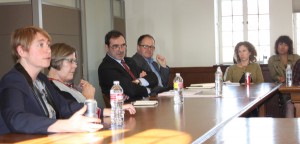Profs debate role of the humanities
Experts debated the use of learning the humanities for students in 21st century universities during a panel discussion at Doheny Memorial Library on Monday.
The panelists, which included Pascal Arnaud, a professor of history at the Université Lumière Lyon 2; Peggy Kamuf, a professor of French and comparative literature and English; and Vanessa Schwartz, a professor of history, all agreed that the methods of instructing humanities are changing.

Higher ed · Professors from varying specialities in the humanities talk about the impact of technology and the changing university environments in their fields during a panel discussion at Doheny Memorial Library on Monday. – Constance Ge | Daily Trojan
Arnaud argued that the new emergence of technology requires instructors within the humanities to infuse technology in their teaching methods, such as using digital libraries. Historically, Arnaud said technology and the humanities have been viewed as complete opposites, but borrowing ideas from digital learning could help the study of the humanities advance.
“We need to use the enemy’s method,” Arnaud said. “We should explore a new way and create impact factors in the humanities section. The future of the humanities is basically in the digital humanities.”
Arnaud emphasized that the United States and Europe view this instruction differently based on the respective structures of their university systems. However, he believed the same things could be applied to both the United States and Europe.
Kamuf agreed with the need to incorporate technology, although she said she believes it is important to maintain the standards of teaching the humanities.
“We cannot accept the agreement that we should be like them, but no, we have to be different in the classroom,” Kamuf said. “We must acknowledge that [studying the humanities] won’t work for all students, but it will inspire some that have never thought about the humanities.”
Schwartz said she believes the study of humanities is fundamental to the growth of a student, regardless of their chosen discipline.
“Every person, even an engineer or scientist, has a book that changed them,” Schwartz said. “Or a painting that changed their lives. So the capacity to learn and think doesn’t change and that is what the students learn when they come to college.”
Despite the disagreement among the panelists over the current state of the humanities on college campuses, all of them believed the humanities could be made stronger through more collaboration.
The USC Sidney Harman Academy of Polymathic Study and the Early Modern Studies Institute hosted the panel. Throughout the year, the academy offers a series of conversations that align with the four quadrants of Polymathic inquiry, intended to raise integrated interdisciplinary awareness among the student body.
Benji Ng, a sophomore majoring in communication, believes exploring interdisciplinary studies can be useful.
“I think there’s a lot of things that we get bombarded with at college,” Ng said. “Because we’re still young the professors believe we’re still able to strive for idealism. Plus these panels let me discuss things that don’t usually come up in class.”

“Benji Ng, a sophomore majoring in communication,” sounds quite bright.